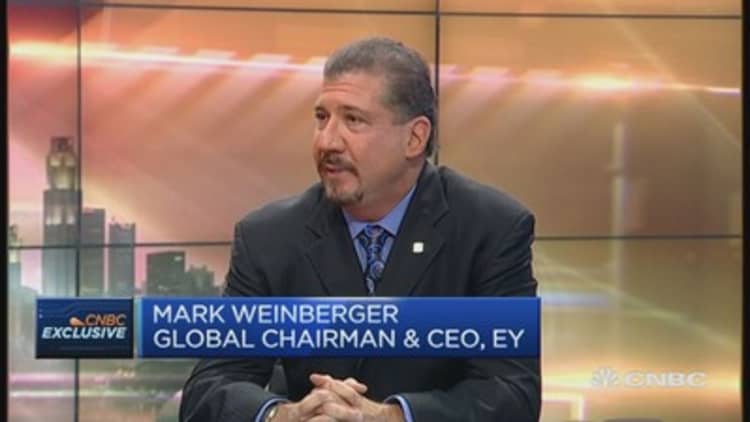
Conditions may be ripe for a December interest rate hike in the U.S., but the global economy is still uncertain, fragile and fragmented, EY's global chairman and CEO Mark Weinberger told CNBC.
"The U.S. economy is stable (but) it has significant headwinds. You're looking at tremendous uncertainty," he said, pointing to the looming U.S. presidential election, the question of when the Federal Reserve will raise interest rates and what effect that will have on the .
But still, he thinks conditions appear ripe for a hike.
"Look at the overall economy: Low interest rates, low inflation, energy prices low, job growth stable, wages starting to rise," he said. "There is a sense of normalcy there, but not strong growth."
It's a tug-of-war that was visible in the summary released Wednesday of the Federal Open Market Committee's (FOMC) meeting in October. The minutes contained the expected nod toward raising the key funds rate in December so long as conditions warrant.
But the minutes also showed a committee more divided in sentiment, if not in actual voting, than it's been since Janet Yellen chaired her first meeting in March 2014. Traders took down the possibility of a December rate hike after the release of the minutes, from a 74 percent chance to 68 percent.
Members debated the wisdom both of moving too soon and waiting too long. They wondered about delivering the wrong message both at the October meeting and after future FOMC gatherings where, ostensibly, the committee will begin hiking rates at a measured pace. And they debated not only over what to do should things continue to improve, but also how to proceed should conditions worsen.
The wavering viewpoints aren't just about economic conditions. There's also quite a bit of geopolitical uncertainty in the mix, Weinberger said.
"What's happening with ISIS and the terrorism around the world. It could be what's going on in Syria; it could be election results; it could be China in August devaluing the currency," he said.
At the same time, economies are heading in divergent directions, Weinberger said.
"It really is interesting to see monetary policy around the world going completely different directions. The ECB, of course, in Europe is going ahead and doing quantitative easing; the U.S. is thinking of raising rates as the U.K. is' China and Japan are providing liquidity," Weinberger said. "So the effect on the commodity and currency markets is just creating tremendous uncertainty."
- Jeff Cox contributed to this report.


